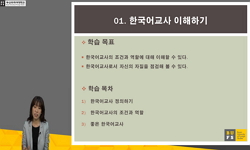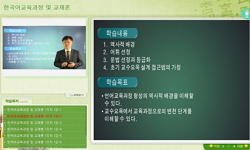Even though communication can be possible without grammar, it becomes impossible without vocabulary. Acquiring a rich vocabulary is crucial for successful language learning and fluent communication. Lack of vocabulary becomes a significant issue in la...
http://chineseinput.net/에서 pinyin(병음)방식으로 중국어를 변환할 수 있습니다.
변환된 중국어를 복사하여 사용하시면 됩니다.
- 中文 을 입력하시려면 zhongwen을 입력하시고 space를누르시면됩니다.
- 北京 을 입력하시려면 beijing을 입력하시고 space를 누르시면 됩니다.
https://www.riss.kr/link?id=T16944909
- 저자
-
발행사항
서울 : 한국외국어대학교 KFL대학원, 2024
-
학위논문사항
학위논문(석사) -- 한국외국어대학교 KFL대학원 , 외국어로서의한국어교육학과 , 2024. 2
-
발행연도
2024
-
작성언어
한국어
- 주제어
-
DDC
495.107K 판사항(22)
-
발행국(도시)
서울
-
기타서명
A study on the effectiveness of learning Korean vocabulary using keyword method : Focusing on native English speakers with beginner Korean skills
-
형태사항
iv, 77 p. : 삽도 ; 26 cm
-
일반주기명
한국외국어대학교 논문은 저작권에 의해 보호받습니다.
지도교수: 안정민
참고문헌: p. 61-65 -
UCI식별코드
I804:11059-200000738485
- 소장기관
-
0
상세조회 -
0
다운로드
부가정보
다국어 초록 (Multilingual Abstract)
Even though communication can be possible without grammar, it becomes impossible without vocabulary. Acquiring a rich vocabulary is crucial for successful language learning and fluent communication. Lack of vocabulary becomes a significant issue in language learning. The ultimate goal for learners attempting to learn a foreign language is to communicate effectively. Vocabulary acquisition, therefore, becomes an essential process for achieving this goal. However, while vocabulary is recognized as a fundamental element for successful language learning, acquiring and retaining a large vocabulary is not easy as expected. This difficulty stems from the limitations of human memory. Generally, efficiently memorizing a significant amount of vocabulary within a short period is challenging for foreign language learners, adding to their learning burden. To alleviate this burden of memorization, various mnemonic techniques have been traditionally researched, among which the 'Keyword Method' has been proven effective in vocabulary learning through numerous studies. The Keyword Method involves linking the target word in the learning language with a 'keyword' in the native language, forming a mental 'image' that interacts between the keyword and the native language word to learn the meaning of the target word. Here, the 'keyword' refers to a native language word that shares some similarity in pronunciation with the target word, and the 'image' refers to the learners creating a mental image of the material to be easily stored in long-term memory. In Korea, the Keyword Method has gained significant attention in the field of English education, and there is widespread availability of vocabulary lists and lectures utilizing this technique. However, research in the field of Korean language education regarding this method is not well-established, and there is a lack of studies validating its effectiveness. Therefore, due to the scarcity of samples, it is challenging to prove the effectiveness of the Keyword Method in Korean vocabulary retention. Consequently, this study aims to verify if the Keyword Method is effective in Korean vocabulary retention and thereby demonstrate its potential as a new approach in Korean vocabulary education.
목차 (Table of Contents)
- 1. 서론 1
- 1.1. 연구 목적 1
- 1.2. 선행 연구 분석 4
- 1.2.1. 국외 핵심어 기법 연구 4
- 1.2.2. 국내 핵심어 기법 연구 6
- 1. 서론 1
- 1.1. 연구 목적 1
- 1.2. 선행 연구 분석 4
- 1.2.1. 국외 핵심어 기법 연구 4
- 1.2.2. 국내 핵심어 기법 연구 6
- 1.3. 논문 구성 10
- 2. 이론적 배경 12
- 2.1. 어휘 교육의 필요성 12
- 2.2. 인지심리학 관점 기억 이론 14
- 2.2.1. 정보 처리 이론 14
- 2.2.2. 정교화 18
- 2.2.3. 이중 부호화 이론 19
- 2.3. 핵심어 기법 21
- 3. 연구방법 26
- 3.1. 연구 대상 26
- 3.2. 연구 도구 31
- 3.2.1. 실험 어휘 목록 31
- 3.2.2. 핵심어 기법 적용 어휘 목록 실제 33
- 3.2.3. 실험어휘 유형별 제시 35
- 3.3. 연구 절차 39
- 4. 연구결과 50
- 4.1. 어휘 암기 방법에 따른 평균 차이 50
- 4.2. 학습자 변인에 따른 평균 차이 53
- 4.2.1. 학습 기간 53
- 4.2.2. 출신 대륙 54
- 4.2.3. 연령대 55
- 5. 결론 57
- 참고문헌 61
- <부록> 66
- ABSTRACT 76












